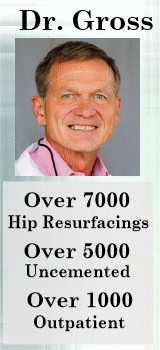Hi
You might want to read some of the doctor interviews I have posted. Many of them discuss how long it takes for the bone to heal
http://www.surfacehippy.info/doctorinterviews/doctorinterviews.phpDr. Clarke
2.) How long do you feel it takes for the bone to be fully healed, grow into the prosthesis? What is the recommended time you tell your patients before they can start to run again/do impact sports?
From clinical and laboratory research, it would seem that the acetabulum is generally adequately fixed from an ingrowth perspective at about 3 months for most patients, but this process evolves significantly more for 1 year and then more slowly (like all living bone) for the rest of the life of the patient.
Dr. Gross
How long do you feel it takes for the bone to be fully healed, grow into the prosthesis?
It is a gradual process that proceeds over 6-12 months. Dog studies have shown that the process has already begun by 6 weeks postop. At 6 months, I estimate that 90% of bone ingrowth has occurred. After 12 months bone remodeling around an implant porous surface should be back to the normal baseline with the implant well incorporated. Some impact early on will likely stimulate bone ingrowth, while too much may cause implant – bone micromotion and result in failure of ingrowth. How much then is too much?
From clinical and laboratory research, it would seem that the acetabulum is generally adequately fixed from an ingrowth perspective at about 3 months for most patients, but this process evolves significantly more for 1 year and then more slowly (like all living bone) for the rest of the life of the patient.
Dr. Jinna
How long do you feel it takes for the bone to be fully healed, grow into the prosthesis? What is the recommended time you tell your patients before they can start to run again/do impact sports?
Running and impact sports can start at about 6 mos.
Dr. Kelly
How long do you feel it takes for the bone to be fully healed, grow into the prosthesis? What is the recommended time you tell your patients before they can start to run again/do impact sports?
I feel that it takes on average 6 - 12 months for the bone to fully ingrow with the acetabular component. Many patients show radiographic evidence of ingrowth in the 3 month range but the majority take 6-12 months to show maximum ingrowth of bone. The amount of impact to which the prosthesis is subjected has some bearing on the rapidity of ingrowth also. I advise my patients not to run or engage in high impact for 6 months post-operatively. The femoral neck regains its strength at that point in time.
Mr. McMinn
Bone Recovery and Return To Sport
The evidence from a DEXA study on BHR patients published from Japan is that the bone density in the proximal femur returns to normal 1 year after operation. The at-risk period for femoral neck fracture following the BHR is in the 6 months after surgery. I advise patients not to return to impact sport for 1 year after surgery. For those patients who want to road run, I get them running on a treadmill at 10 months post-op and they resume road running at 12 months post-op. My unit published on activity level after resurfacing some years ago in a group of patients who followed those rules. In young men with a single osteoarthritic hip resurfaced, 92 % played sport and 62 % played impact sport. The ladies were not quite as active, but you can see from the publication that they still had an impressive activity level. In the total group their 10 year implant survival is 99.8 % showing that high activity introduced at a sensible time does not deteriorate the results.
You can read others for yourself. Sounds to me like you are going to have more problems trying to get all your muscles back in shape. A 12 - 14 hour day is a very long day.
You should not be worried about the acetabular cup loosening - normally that would happen fairly quickly. That is also SURGEON ERROR - not something caused by a patient's activity. I have posts about that.
Pat











